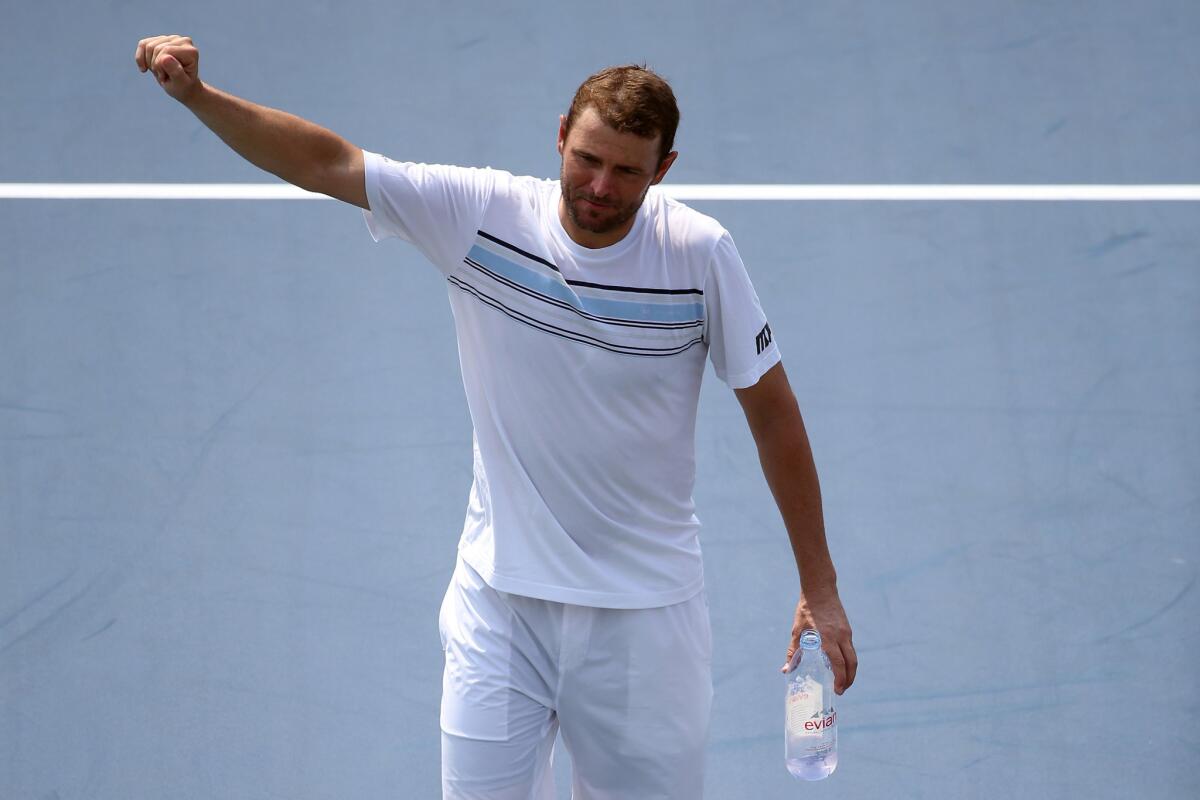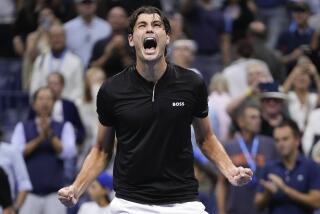Mardy Fish limps off into the sunset at U.S. Open

Mardy Fish walks off of the court after losing his U.S. Open second round match against Feliciano Lopez.
- Share via
from NEW YORK — The long and tortuous road that has characterized the tennis career of Mardy Fish ended here Wednesday at the U.S. Open with a long and tortuous match.
Fish lost his second-rounder to Feliciano Lopez of Spain, 2-6, 6-3, 1-6, 7-5, 6-3.
It went on for 3 hours and 11 minutes and, much like the career of the 33-year-old Fish, it had moments that were dazzling and others that were excruciating. If Fish were to characterize, in two words, what he has felt and gone through in a 14-year career that began as a tennis prodigy in Minnesota, the words would be pain and joy.
Maybe not in that order.
The joy was that he got himself up to No. 7 in the world in 2011. The pain was that that climb caused him to lose the joy.
Fish lives in Los Angeles now. He has effectively been a non-issue on the pro tour since he defaulted his fourth-round match to Roger Federer in this tournament in 2012. Even though it was Federer he was facing, it was still a shot at his fourth Grand Slam quarterfinal.
In a car on the way to the match, Fish realized that he couldn’t play. He just couldn’t do it. He had had an anxiety attack near the end of his third-round match and now others were coming, faster and faster, more crushing each time.
He was about to play Roger Federer at the U.S. Open, the pinnacle of his career, and he couldn’t. Physically couldn’t, because he mentally couldn’t. The height of his career had triggered the abyss of his career.
Mardy Fish defaulted to Roger Federer and went away.
It could have been the last we heard of him. With most athletes, it would have been. As Fish says, “It is not masculine” for athletes to show weaknesses. Certainly not to publicly talk about them.
Little by little, Fish crept back onto the pro tennis scene. He played in a tour match for the first time in 18 months this March at Indian Wells, when he faced Ryan Harrison. He lost, but it didn’t matter. He played a bit more, won a couple and lost a few more. It didn’t matter.
He was out, telling his story, being un-masculine.
He entered Wednesday’s match against Lopez as the No. 581-ranked player in the world. He had played five matches this year and had a 2-3 record. This was to be his last tournament, he said, because it was his favorite tournament, the ideal special place for his athletic ending.
Perhaps not trusting that the people who do this for a living would get it right, Fish wrote a piece for Derek Jeter’s the Players’ Tribune, a website in which athletes tell it their way. No chance of being misquoted. No chance of the local columnist spinning it wrong.
The result was a masterpiece of introspection and clarity, a piece that ought to prompt sports editors everywhere to hire him to do that more, like twice a week.
“This is a story about how a mental health problem took my job away,” Fish wrote.
He also wrote, “There is no tournament to win for mental health. There are no quarterfinals, or semifinals, or finals.”
He knew what he was doing, coming to the U.S. Open. He wasn’t seeking a last hurrah, not even an exclamation point. Just a period.
“This isn’t a sports movie, of course,” he wrote, “and there won’t be a sports movie ending. I won’t be riding off into the sunset, lifting a trophy. I’m not going to win the tournament.”
No, he wasn’t. That was never the point. That he won his first-round match was enough of a surprise. And then, there he was, 2 hours 23 minutes into the match with No. 18 Lopez, in front of a packed and adoring home crowd at Louis Armstrong Stadium — some of them knowing the story and the rest just rooting for an American. He was, incredibly, serving for the match at 5-4 of the fourth set.
And, as Fish admitted later, “playing my worst game of the match.”
That opened the door for Lopez to rally and bring on the inevitable fifth set, during which one slightly insensitive fan kept yelling for a “fish fry.”
Sadly, that’s what we soon had. Fish was cooked, cramping badly and struggling just to finish. The match quickly went from something exciting to watch to something painful. Lopez, admitting later to also being dead tired, kept making mistakes and keeping Fish in the match.
“I actually had more chances in the fifth than he did,” Fish said later, in amazement.
Every time he took more than three or four steps, Fish cramped. Yet he had two break points at 3-3.
“It’s hard to play somebody who is wounded,” Fish said later, explaining Lopez’s inability to close things out.
Running was essential, and that was something Fish could no longer do.
When it ended, with the crowd on its feet and paying tribute, more to the vanquished than the victor, Lopez gave Fish a little hug at the net, told him he had played better and deserved to win, and then told the crowd in his post-match interview the same thing.
“It was so sad what happened to him,” the 33-year-old Spaniard told the media afterward.
Fish left the court with a slight limp and a little wave. He had lost and also had conquered. As he disappeared from the court, and into his new life, his own words from the Players’ Tribune framed the scene perfectly:
“Sports end in a result. And life keeps going. Mine, I hope, is just getting started.”
Twitter: @DwyreLATimes
More to Read
Go beyond the scoreboard
Get the latest on L.A.'s teams in the daily Sports Report newsletter.
You may occasionally receive promotional content from the Los Angeles Times.











